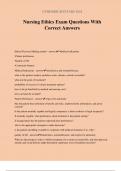©THEBRIGHTSTARS 2024
Nursing Ethics Exam Questions With
Correct Answers
Ethical Decision Making models - answer✔•Medical indications
•Patient preferences
•Quality of life
•Contextual features
Medical Indications - answer✔beneficence and nonmaleficence,
what is the patients medica; problem, acute, chronic, critical, reversible?
what are the goals of treatment?
probablitiy of success of various treatment options?
how is the pt benefited by medical and nursing care?
how can harm be avoided?
Patient Preferences - answer✔respect for autonomy
Has the patient been informed of benefis and risks, understood the information, and given
consent?
Is the patient mentally capable and legally competent, is there evidence of legal incapacity?
If mentally capable, what preferences about treatment is the patient stating?
if incapacitated, has the patient expressed prior preferences?
who is the appropraite surrogate to make decisions?
is the patient unwilling or unable to cooperate with medical treatment, if so, why?
quality of life - answer✔Beneficience, nonmaleficence, and respect for autonomy
What are the prospects with or without treatment, for a return to normal life, and what physical,
mental, and social deficits might the patient experience even if treatment succeeds?
, ©THEBRIGHTSTARS 2024
On what grounds can anyone judge that some quality of life would be undesirable for a patient
who cannot make or express judgement?
Are there biases that might prejudice the providers evaluation of the patients quality of life?
what is the legal and ethical status of suicide?
Contextual Features - answer✔Justice and fairness
Are there professional, interprofessional, or business interests that might create conflict of
interest in the clinical treatment of patients?
Are there financial factors that create conflicts of interest in clinical decisions?
Are there religious issues that might affect clinical decision?
what are legal issues that might affects clinical decisions?
Paternalism - answer✔the overriding of a person's actions or decision-making (autonomy) for
his own good.
acting in ways they believe promotes a patients wellbeing (beneficience).
ex: a nurse avoids telling a pt that her BP is elveated because the nurse believes this information
will upset the pt and further elevate the BP.
Elderly people may not remember the date, time, or peoples names, but they may still have the
capacity to make decisions.
Utilitarianism - answer✔promotes the greatest good (happiness or pleasure) and to produce the
least amount of harm (unhappiness, suffering, pain) possible in a situation.
(greatest good for the greatest number of people who may be affected by an action. )
Rule utilitarian-certain rules such as do not kill, do not break promises, and do not lie, when
followed usually create the best consequences for most people.
-seeks the greatest happiness for all
Act utilitarian- each action in particular circumstance should e chosen based on its likely good
consequences rather than on following an inherently moral, universal rule.
-which course of action will bring about the greatest happiness, or the least harm.
Social Justice - answer✔-represents the position that benefits and burdems should be
distributed fairly among members of a society,
or ideally that all members of a society should have the same rights, benfefits and opportunities.
- the fair distribution of benefits and burdems among members in a society.
, ©THEBRIGHTSTARS 2024
Deontology - answer✔Approach to ethics that judges the morality of an action based on the
action's adherence to rules. Described as duty or obligation, because rules 'binds you to your
duty'.
-focuses on duties and rules.
- duty to do something
ex: code blue at end of shift, your moral duty is to stay and help even if youre not getting paid
Kantian Ethics - answer✔the belief that people should be treated as ends and never as means to
the ends of others
-Balance rights of individuals with rights of populations and communities
•Respecting autonomy while protecting safety
-Each rational being is ethically bound to act only from a sense of duty
.•Consequences of an action are irrelevant.
•There are two types of duties: hypothetical imperative and categorical imperative
Nonmaleficence - answer✔duty to do no harm.
healthcare workers are encouraged to do good (beneficience), if for some reason they can't do
good, they are required to at least do no harm.
-intentional avoidance of actions that cause harm.
-avoid negligent care and harm when deciding whether to provide or withhold or withdraw
treatment
Beneficence - answer✔to do good.
-performing deeds of mercy,kindness,friendship,charity
-people take actions to benefit and promote the welfare of other people.
protect and defend the rights of others, prevent harm from occuring to others, remove conditions
that will cause harm to others, help persons with disablities, rescue persons in danger.
-Provision 2.1 code of ethics- to have theri patients' interests and well being as their primary
concern.
Categorical Imperative (Kant) - answer✔- We should always act in such a way that our moral
decisions could be used as a guide for everyone's moral behaviour
-follow a unconditional framework of rules , as a guide to know the rightness of actions and ones
mora; duties.




